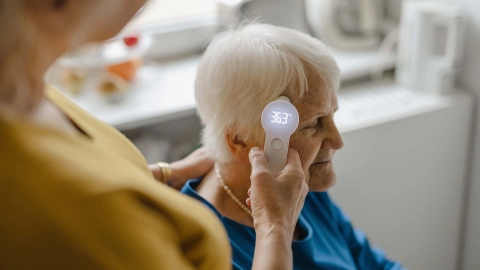Care Caring for people with dementia
There are many challenges when caring for people with dementia in the home. This article tells family caregivers what is important in relation to caring for people with dementia, and which support options are available.
At a glance
- Family caregivers face many challenges when caring for people with dementia.
- As the illness progresses, it becomes increasingly important to put oneself in the position of the person with dementia. This can make communication easier.
- When facing difficulties and problems, people with dementia often react with challenging, aggressive behavior. Different strategies can help defuse situations like these.
- In everyday life movement, structure, and a secure environment are helpful for people with dementia.
- In case of questions, many places offer free advice.
- It is advisable to draw up a lasting power of attorney for health and welfare, a health care proxy, and a living will.

What is dementia, and what does it mean for family caregivers?
Someone with dementia loses their memory, concentration, and ability to learn. This is caused by changes in the brain. For people with dementia it becomes increasingly difficult to cope with everyday life on their own.
In Germany, around a third of people with dementia are cared for at home by family members. This care is often a major challenge for them. There are communication problems, aggressive behavior, and nighttime unrest and “wandering”.
Caring for a person with dementia is made easier with support. Family caregivers can get advice, help and support from advice centers, self-help organizations, and local networks.
Specific points of contact can be found in the “Advice and relief” section of this article.
What can make it easier to deal with people with dementia?
The more the dementia progresses, the more difficult it is to remain in good contact with the person. After a certain point it is no longer possible to talk about memories and experiences in the usual way.
So it is increasingly important to regard the person with dementia less as a thinking being, and more as a feeling and social person: even though planned actions and thoughts are less and less possible for people with dementia, they still feel and want to act reasonably and belong.
In many cases, what they say and how they behave is best explained from the sufferer’s life history. Despite their limitations, it is also important to recognize and treat the person with dementia as a person who has equal rights.
Change of perspective: putting oneself in their shoes
To understand people with dementia, it can help to adopt their perspective. This can improve understanding. It also helps to summon up the patience required. This can sometimes go missing in everyday life.
To change your perspective, ask yourself these questions:
- What would I do if I were in their situation (and I were unable, for example, to dress myself)?
- How would I feel if I were in this situation (and no longer knew, for example, who I am talking to)?
- What would help me if I were in this situation (and I kept losing the sense of what was being said, for instance)?
Children and adolescents
Children and adolescents also notice when a family member has dementia.
The game “Was hat Oma” (“What’s up with Grandma?”) and the German Alzheimer Society’s website Alzheimer & YOU explain in terms a child can understand why the family member is suddenly behaving differently and what children and adolescents can do (in German).
How can family members deal with a person’s memory and thinking being impaired?
For people with dementia, memory loss when they first become ill is often accompanied by shame and withdrawal. As memory declines it becomes more difficult for them to orient themselves.
If people with dementia have memory problems, the following thoughts and recommendations can help relatives:
- Accidents and mix-ups are normal. So do not correct the person.
- Asking questions to exercise the memory does not help.
- Do not take memory problems personally, for example if the person in need of care forgets your name.
- Do not take accusations personally. The person in need of care does not mean you, rather they are confused themselves.
- Notes or signs around the home can help the memory at the start of the illness.
- Structure the environment and the day. Try to keep things in a familiar order as much as possible and maintain usual routines and activities.
- Look at old photos together and keep memories alive for as long as possible.
If sufferers cannot understand something, the following thoughts and recommendations may help:
- Do not try arguing logically.
- Allow the person to be right, or change the subject.
- Do not expect explanations, justifications, or apologies.
- If something is causing particular difficulties or anxiety, try to find out what it is so that you can get rid of it.
- Try to calm them. You could say that you are there and watching over them, or hold their hand.
Reacting to problems of memory and understanding in this way can make it easier to get on with one another.
What can you do in the event of challenging behavior or violence?
It sometimes seems as though people with dementia get aggressive or violent as if from nowhere. In such cases, professionals speak of “challenging behavior”, because there are usually reasons for the aggression, but people with dementia are no longer able to put them into words.
If this type of behavior has occurred while you are caring, think about the specific situation afterwards. There is sometimes a trigger for the aggressive behavior. Was the person excited or stressed? Try to put yourself in their shoes. What could have made them angry? Did the person misunderstand something? If you find a trigger, you can try to prevent it next time.
Challenging behavior also occurs in people with dementia who were very calm and peaceful before their illness.
Many relatives find the challenging behavior of the people they are caring for difficult. When such behavior occurs, these recommendations can be a useful guide:
- Take a deep breath. Stay as calm as possible. Tell yourself that aggression is often part of the illness.
- Try to be a calming influence on the person.
- Make use of things that could soothe them, such as music or a scent.
- Physical contact or distraction can help too.
- Keep an escape route open.
- Avoid a physical confrontation and do not grip the person.
- If the person becomes violent, leave the room.
- Cut yourself some slack if you sometimes respond unreasonably or feel fed up. It is also useful to learn to deal with your own aggression.
- Get help if necessary.
- Talk through their behavior with the doctor treating them.
How can relatives help if people are restless and have sleeping problems?
As the illness progresses, people with dementia can often become restless and have a strong desire to be on the move. It often helps to permit a lot of movement. If the restlessness is extreme, you can try to find the cause together. Is the person feeling physically unwell? Are they perhaps hungry, thirsty or in need of the toilet? A joint activity or a change of location can help combat restlessness. Transmit a sense of safety and security.
Problems falling asleep or sleeping through
With dementia, sleep is often impaired. If people with dementia are waking up at night, it can help to restrict their sleep during the day and make sure they get plenty of exercise. Rituals are also important, for example tea at bedtime. If something particular is preventing the person from sleeping, you might be able to find the problem and remove it.
If the person “wanders about” at night, the main thing is to prevent the person from hurting themselves or getting lost. Staircases, windows and cookers should therefore be made secure, and external doors should be locked. If you have taken these safety measures, you can relax and sleep.
Important: Certain drugs can affect the sleep. Ask the person’s doctor about this. But do not turn to tranquilizers or sleeping tablets without consulting the doctor. Over-the-counter medicines can also have side-effects and should only be given if the doctor recommends them.
How can you arrange everyday life and the home environment for people with dementia?
Because the short-term memory deteriorates as the illness progresses, it becomes more difficult to process new things. So it is important to give people with dementia time and give them things they can rely on. You should stick to familiar procedures and structures. If changes are needed, try to introduce them gradually.
Try to focus on existing capabilities, too. People with dementia want to do things together. Even though thinking is increasingly difficult, they can often remember old songs, paint, and many other things. Hobbies and activities that they enjoy are important.
Do not let the person in need of care withdraw entirely to their bed. Try to involve them, for example with cooking or laying the table. Shared activities such as eating, going for walks and excursions can help. It is particularly important that people with dementia have set times for eating, resting, doing things, and going to bed.
Adapt the home environment
The home of a person with dementia should be clearly arranged and well lit. It is ideal if furniture and souvenirs stay in their usual place. Souvenirs are of particular value, as they usually provide a sense of security.
Stimuli should be reduced, omitting garish patterns and bright colors. But it helps if important things stand out in the environment. Contrasts are an advantage, for example, when it comes to the toilet, light switches, handrails, door frames, and steps. Rooms can also be labeled – for example, a picture of a bed on the bedroom door.
Making things safe
Staircases, windows and cookers should be made secure, and external doors should be closed. The water temperatures should be limited to 40 degrees at most. Doors such as the bathroom door should be capable of being unlocked from outside, in case a person in need of care has locked themselves in and cannot open the door from inside.
Where can family carers find advice and help?
Family caregivers can be stretched to their limits when caring for people with dementia. So it is all the more important to get advice on help and support options at an early stage.
Advice and information on dementia
The German Alzheimer’s Society Alzheimer hotline provides advice on all questions to do with dementia.
Phone: 030 259 37 95 14
The Wegweiser Demenz (Dementia Guide) run by the Federal Ministry of Family Affairs, Senior Citizens, Women and Youth is a forum and platform providing information for carers.
Advice on care
Care support centers and care advice centers provide free, detailed, independent information about caring for people with dementia. They also provide practical support via benefits under the care insurance scheme, such as care services, daytime and nighttime care and respite care.
You can find your local care support center and dementia advice center in the advice database provided by the Center for Quality in Care (Zentrum für Qualität in der Pflege – ZQP).
The Federal Ministry of Health’s public hotline answers queries about the care insurance scheme.
Phone: 030 340 60 66 02
Self-help and family caregiver groups
Self-help and family caregiver groups enable you to interact with other people who are in a similar situation. The mutual understanding can help people unburden. There you will usually get quick advice on practical problems, tips on local professional help, and other helpful recommendations.
There is a national German database for family caregiver and self-help groups run by the Nationale Kontakt- und Informationsstelle zur Anregung und Unterstützung von Selbsthilfegruppen (NAKOS) (National Contact and Information Point For Encouraging and Supporting Self-Help Groups).
You can also find self-help and family caregiver groups on the website of the German Alzheimer’s Society (Deutsche Alzheimer Gesellschaft e.V.).
Dementia networks
Find out whether you can join a local network initiative.
Advice when you are stressed
Have you become stressed by your caring? If so, you can get advice from the on-call medical service on 116 117.
In the event of acute crises or care-related abuse, the website of the Center for Quality in Care foundation (Zentrum für Qualität in der Pflege) shows which crisis line is currently available at all times of day.
The TelefonSeelsorge hotline is ready to listen to your concerns. They provide free 24-hour advice: on the numbers 0800 – 111 0 111 or 0800 – 111 0 222.
Carer children and adolescents
Children and adolescents are also often involved in providing care.
The Pausentaste website provided by the Federal Ministry of Family Affairs (Bundesfamilienministerium) therefore offers practical and psychological support for children and adolescents who are carers.
The “Nummer gegen Kummer” helpline also offers support to children and adolescents who are under strain. They can receive free advice Mondays to Saturdays from 2 p.m. to 8 p.m.
Phone: 116 111.
Legal issues
It is advisable for people with dementia to quickly specify who can make important decisions for them at a later stage. More information about this can be found in the article Planning ahead for future care.
- Bundesministerium für Gesundheit (BMG). Ratgeber Demenz: Informationen für die häusliche Pflege von Menschen mit Demenz. 17. aktualisierte Auflage, April 2023. Bestellnummer BMG-P-11021. BMG: Berlin 2023.
- Deutsche Alzheimer Gesellschaft. Antworten auf häufige Fragen. 1. Was heißt eigentlich „Demenz“ und „Alzheimer“? Aufgerufen am 28.05.2024.
- Medizinischer Dienst des Spitzenverbandes Bund der Krankenkassen e.V. (MDS). Grundsatzstellungnahme: Menschen mit Demenz – Begleitung, Pflege und Therapie. MDS: Essen 2019.
- Weltgesundheitsorganisation (WHO). iSupport for dementia. Training and support manual for carers of people with dementia. WHO: Geneva 2019.
- Zentrum für Qualität in der Pflege (ZQP). Demenz: Anregungen für Partnerinnen und Partner. 13. unveränderte Auflage, ZQP: Berlin 2023.
Reviewed by the German Alzheimer’s Society (Deutsche Alzheimer Gesellschaft e.V. – DAlzG)
As at:





